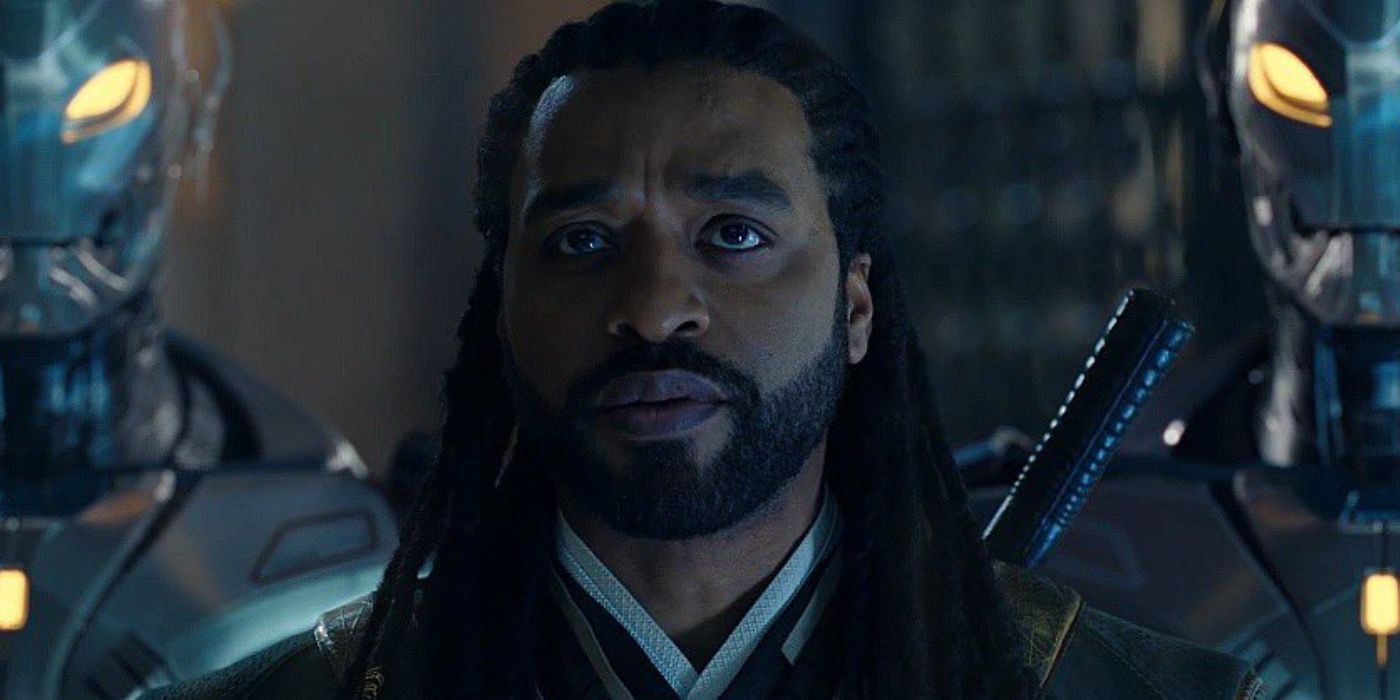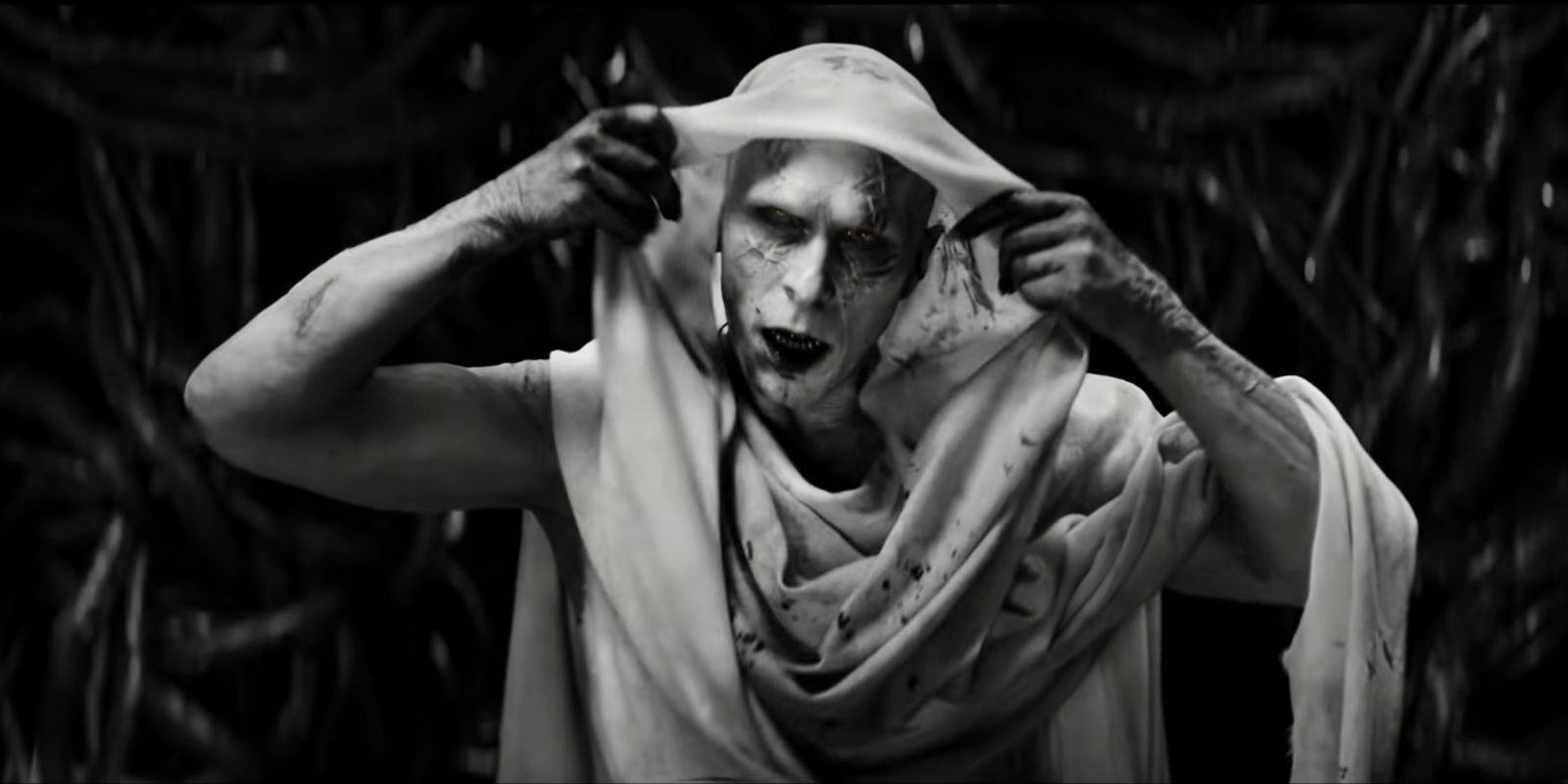The following contains spoilers for Doctor Strange in the Multiverse of Madness, now playing in theaters.
In Doctor Strange, Stephen Strange learns the mystic arts from the Ancient One and Karl Mordo. Chiwetel Ejiofor's dramatic performance as Mordo underlined the character's reverence for tradition, culminating in his rejection of Strange's rebellious approach. When it got revealed that Ejiofor would be returning in Doctor Strange in the Multiverse of Madness, fans may have expected his story to pick up where it left off. However, only Mordo's alternate universe counterpart appeared, with a completely different role in the story. Well, the latest trailer for Thor: Love and Thunder introduces a character with a similar story to Mordo's -- Christian Bale's Gorr the God Butcher.
Gorr's vow to kill all gods seems eerily similar to Mordo's chilling assertion that the world has "too many sorcerers" from the end of Doctor Strange, but their motivations may not be as close as they seem. Both villains are opposed to certain characters with magical powers, but why do they target those who use powers for good?
In Doctor Strange, Mordo learned that the Ancient One had been drawing power from the Dark Dimension to prolong her life so that she could keep helping people as the Sorcerer Supreme. After she died, Mordo criticized her hypocrisy to Strange for doing that which she had taught them was forbidden. Strange later used the forbidden magic of the Eye of Agamotto to reverse time in order to save the Hong Kong Sanctum and then again to convince the extra-dimensional demon Dormammu to leave Earth in peace. Noting the similarity between The Ancient One's rule-breaking and Doctor Strange's, Mordo vowed to "follow this path no longer" and left the New York Sanctum behind.
That is the last time Mordo and Strange interact in the movie, but Strange implies in Multiverse of Madness that Mordo has since tried to kill him -- a shocking development to have happened off-screen. Mordo's philosophy that magic is too sacred and volatile to be used by just anyone has led him to villainy, but it's not inherently unreasonable. In fact, the Ancient One told Strange that he should rely on Mordo's rigid strength, just as Mordo should rely on Strange's flexibility. Perhaps this is part of the reason why Marvel Studios' storytellers have not yet given the original Mordo a villainous role in a movie: he could still be more interesting as another hero with his own approach to magic.
Meanwhile, Thor: Love and Thunder's second trailer reveals that Christian Bale's Gorr the God Butcher is outraged by super-powered beings for a different reason. The hooded figure declares: "The only ones who gods care about is themselves, so this is my vow: all gods will die." Just as Mordo's philosophy is an extreme version of a logical sentiment, Gorr's anger at the gods is justifiable to an extent. The MCU has plenty of selfish gods and god-like beings, such as Guardians of the Galaxy Vol. 2's chauvinistic Ego and Eternals' stubborn Ikaris.
However, both Mordo and Gorr's outrage at super-powered beings seems to make them target people who genuinely use their powers for good. That could be because Strange and Thor's biggest mistakes initially seem to confirm their opponents' worst fears. Strange accidentally endangered New York with his memory spell in Spider-Man: No Way Home, but his refusal to sacrifice America Chavez in Multiverse of Madness reveals that he is not as careless about collateral damage as Mordo might fear. Likewise, Thor may have failed to land his finishing blow on Thanos in Avengers: Infinity War, but it certainly wasn't because he didn't care enough.
Mordo understood that Strange and the Ancient One only used forbidden magic to save others, but he still disapproved of their recklessness because the potential cost was high. In contrast, Gorr's accusation of selfishness could mean that he believes the gods don't take their power to do good far enough. Perhaps Mordo and Gorr would have even found themselves on opposite sides of the Sokovia Accords proposals from Captain America: Civil War, with Mordo advocating for more checks and balances on heroes and Gorr wanting to prevent any more excuses.
Regardless, Mordo and Gorr share an antipathy towards certain super-powered beings, but for different reasons. Thor: Love and Thunder may reveal that Gorr's motivations are more complicated than this single line from the trailer implies, and future appearances of Mordo might further complicate the dark path he seems to be heading down. However, both characters represent one of the biggest challenges that the MCU throws at its heroes: disillusionment.
To see how Mordo compares to Gorr, Thor: Love and Thunder hits theaters July 8.




